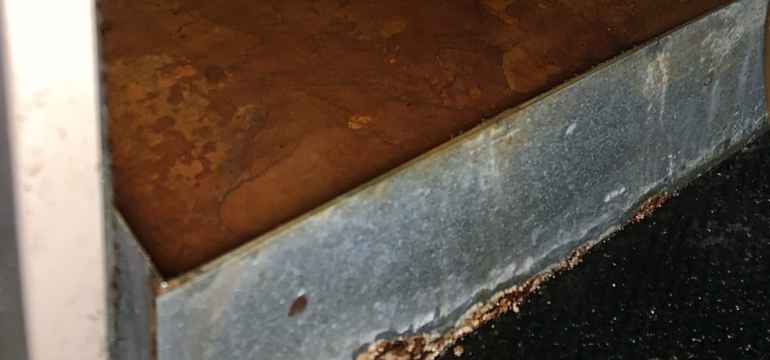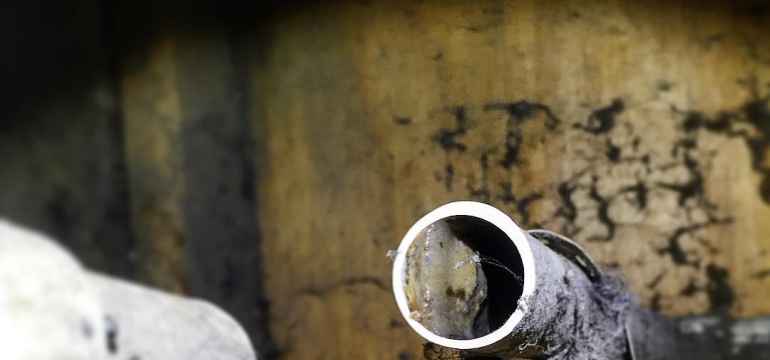If you wake up and notice a puddle on the floor or the smell of mold, your air conditioner may be leaking water. This can lead to lots of problems.
For example, an air conditioner leaking water from the attic could flood your ceiling and cause lasting damage. When this happens, there’s a problem in your system that is causing the normal cooling cycle to malfunction.
In this article, we’ll explore all the potential reasons why your AC unit could be leaking water. We’ll also let you know how to solve the problem. Keep reading to learn more.
Why is my air conditioner leaking water? Try these steps first
- The first thing that you want to do is turn the AC unit off. Doing this will help you prevent more water damage from occurring by ensuring that the unit isn’t continuing to produce more water.
- The next thing you can do is clean up the leaked water. You might be able to do this with some towels if the leak isn’t very severe. But you may need to use a shop vac if there’s a lot of pooled water around your home.
- Next, check and see if your drain pipe has been knocked loose. Over time, this line can become loose and eventually disconnect, resulting in your air conditioner leaking. If this is the problem, you need to realign the pipe and make sure you seal it tightly.
- Finally, it’s possible that your leaking air conditioner is the result of a frozen coil. If that’s the case, here are some fixes that you can try:
- Turn the fan on while your cooling feature is still off. This will help to defrost the evaporator coil by running warm air over the ice. That way, it thaws faster.
- You may also want to try changing your old air filters for new ones. This is especially important if you check your filters and notice clear signs of excess dirt or grime.
- Finally, take a look at our air vents. It’s possible you’ve got something in your home that’s blocking airflow into a return vent. This could be the source of your problem.
It’s definitely possible to fix a leaking AC unit just by taking these steps. But you may also have a more significant issue in your drain pan, drain line, or condensate pump.
If these fixes didn’t work for you, then keep reading. We’ll tell you how to identify and solve some of the other potential causes of a leaking AC unit.
A damaged drain pan can cause your ac to leak water

Your air conditioner unit has a drain pan. Its job is to catch any water that drops from the air conditioner so that it doesn’t get on your floor.
The location of your drain pan will depend on the kind of air conditioner that you have. You may need to check your owner’s manual to verify its location if you can’t find it on your own.
If you think that a damaged drain pan is causing your AC leaking issue, then there’s a simple way to verify that it’s truly the problem.
You’ll need a flashlight and about a gallon of water. These will help you locate small holes or cracks that you may be able to repair with water sealant or epoxy glue to fix the problem. Or, you might need to replace the drain pan entirely.
Here’s what to do:
- Start by turning the central air conditioner on at the thermostat and allowing it to run for about 30 minutes.
- Next, find the inside air handler and look for evidence of water around the unit.
- Next, turn off the power to the air conditioner before removing the access panel and then taking a look at the overflow pan.
- You can use your flashlight to inspect the drain pan and see if you can locate any obvious backups or debris.
- Next, clean out your drain pan as much as you can. You may just have a drain line clog that’s causing this issue.
- After that, try pouring a gallon of water into the drain pan slowly. Make sure that it drains freely into the secondary drain line.
If this is your problem, then it’ll usually make more sense to replace the entire drain plan instead of trying to fix it.
If you’ve got a small crack, you might be able to put a temporary hold on the issue by patching it with epoxy glue. But it may come back again after some time has passed, so replacing the drain pan entirely will be a more lasting fix.
Air conditioner leaking because of a clogged drain line

It’s also possible that your AC is leaking because of a clog in your drain line. This is what carries the water that your AC unit produces outside. Your drain line runs from the air handler that’s inside of your home all the way to the discharge location outside of it.
Blockage in your drain line could come from a variety of sources, including:
- Algae growth
- Dirt and dust from the air handler
- Dirt and dust from outside of the home that are blocking the discharge
- Insects and creatures that have climbed into the pipe and gotten stuck
You need to fix these blockages to repair the issue. Otherwise, water will continue building up in your AC unit’s drip pan.
How to unclog your condensate drain line
If you do end up needing to unclog your condensate drain line, you should be able to do it on your own. It’s a fairly simple process, which you can complete by following these instructions.
Step 1: See how bad the clog is
First, you want to look outside where your drain line ends and see if you have any minor blockages. Fixing your clog can sometimes be as easy as that. You may also want to look inside the drain pan quickly to see if the clog is there.
Step 2: Remove the clog by hand
You may be able to remove minor clogs with your hand. You can just poke a finger into the drain line on each end to see if you can manually dislodge whatever is in there on your own.
If you’ve tried this and your drain line is still clogged, keep reading for more solutions.
Step 3: Turn off your ac unit’s power
The next thing we’re going to do is take apart the drain line. We’ll need to turn off the power first in order to be safe. You can do that by finding the disconnect switch for your air conditioner and making sure that you turn it off.
Step 4: Find the condensate drain line
Your next step is to locate the condensate drain line where it enters your AC. It will almost always be in the air handling unit, which is often in an out-of-the-way part of the home, like the garage or attic.
Step 5: Unclog and clean the vent tee
Your vent tee is also located around the air handler. It’s usually capped with a plastic piece.
Your vent tee is an access point that you can use to clean the condensate line. You want to take off the plastic cap and take a look inside. You may see some build-up when you do, which could be the source of your clog.
It’s easiest to clean out the vent tee when you use a wet/dry vacuum to blow air through it. You may need to wrap a rag around the tee to create a seal.
Step 6: Sanitize your drain line
Next, you can use water to flush out anything that’s left in the condensate line. You can use vinegar as well to remove any lingering build-up. That process just involves pouring a few cups of vinegar into the drain line and allowing it to sit there for about 20 minutes.
Bleach isn’t typically advisable because it can kill plants and damage your home’s siding. Using drain pan tablets regularly is a better solution. It’ll help you stop any unwanted growth in its tracks before it can impact your system.
Experts recommend putting a tablet into your drain pan about once every month for optimal effects.
Step 7: Test your drain line
Finally, you flush your drain line out with water to make sure that everything is back in proper working order. If it is, you’re ready to turn back on your AC.
Preventing water damage from an air conditioner leaking water
If you want to avoid having a similar issue in the future, then being proactive about maintaining your AC unit is the thing to do.
You may also want to contact an HVAC technician and ask about installing safety switches. These will protect your home from water damage if the situation arises again.
You can use a pan switch that will shut your AC unit off whenever too much water accumulates in the drain pan. Just make sure to let a technician do this for you so that you don’t mess up the installation and ruin the switch’s effectiveness.
You may also want to install an EZ trap. These have clear tubing, which allows you to instantly notice whenever a clog is formed.
- What to Do if Your House Smells Like Gas but There’s No Leak - February 6, 2023
- Why Is There a Burning Smell Coming From My Vents? - August 16, 2022
- How to Remove the Musty Smell From Your Air Conditioner - August 16, 2022
